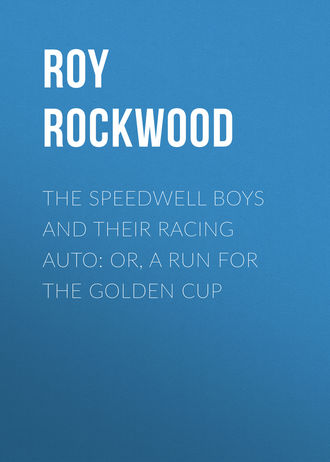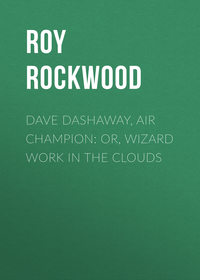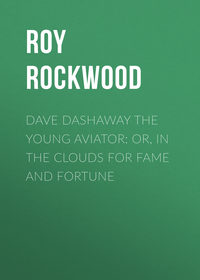 полная версия
полная версияThe Speedwell Boys and Their Racing Auto: or, A Run for the Golden Cup
“Half an hour behind them – or thereabout,” exclaimed Mr. Armitage, with satisfaction. “We should be able to pick that up.”
But even as they started from the garage they met with an accident. A forward tire blew out and the car came down with a solid bump on the roadway.
“Now!” cried Mr. Armitage. “Look at this delay! Isn’t it abominable?”
But Mr. Briggs was a man of quick thought. He was observant, too. He spoke to the owner of the garage. There was a good car standing on the floor and it was for hire. In two minutes it had been run out, Henri was at the wheel, and Mr. Armitage and Mr. Briggs in the tonneau of the hired machine.
Dan had expressed his desire to return to Riverdale. It would soon be night, and he and Billy had many chores to do. They were now thirty miles from home, and the boy feared to go farther without permission from his parents.
“And quite right,” Mr. Armitage said. “But hold yourself ready to-morrow, my boy, if we have the good fortune to overtake those fellows in the maroon car. We shall need you for a witness.”
Dan promised and Mr. Briggs, who had consulted with Henri for a moment, said:
“My chauffeur tells me that you are quite able to run our car back to Holliday’s garage at Riverdale. This man here will put on a new tire and you can get back to town easier in my car than on your machine. Do you want to do me that favor?”
Dan’s sparkling eyes and flushed face replied for him before his lips could form the words. It was so decided, and the others got off quickly in the hired auto. Within the hour Dan started the beautiful touring car on the back track, delighted with his charge, and looking forward to nothing more than a pleasant run over familiar roads to his home town.
It was growing dusk, however, long before he reached Riverdale. Indeed he was all of ten miles from the town when he stopped to light his lamps. Before he started the auto again he observed another car bearing down upon him from ahead, its lights blazing in the dusk.
Dan had pulled out to the side of the road and apprehended no danger. But the coming car was braked quickly when a few rods from him, and its driver brought it to a complete stop beside Mr. Briggs’ vehicle.
One of the four men in the machine leaped out and, to Dan’s amazement, stepped into the front of the maroon car beside him.
“Hold up your hands!” commanded this man, in excited tones. “We’ve got you, at least, if your pals have escaped. Hold up your hands!”
Dan shrank back and demanded a reason for threatening him in this savage way.
“You know what I want,” said the man. “You are in the hands of the law. I arrest you, for the robbery of the Farmers’ National Bank at Riverdale!”
CHAPTER IV
BILLY ACTS ON IMPULSE
The sight of Maxey Solomons and his automobile tossed over the embankment and out of view – as a mad bull might toss a dog – frightened Billy Speedwell and his mates; at the moment they did not, like Dan, think of bringing the three men in the maroon motor car to account for their rashness.
With cries of fear they ran along the road to the broken place in the stone wall. Motor car and driver had disappeared over the brink of the chasm. The tops of several trees, the roots of which were embedded in the soil of the river bank, were visible above the wall. The motor car had crashed into these tree-tops; but the boys did not dream, at first, that the branches would stay such a heavy object.
When they came to the break in the stone wall and leaned over it, they saw the drab automobile hanging in the air, not more than twenty feet below the road. It was upside down and it had stuck in the crotched branches of two of the tall trees.
At first they saw nothing of Maxey; but of course, they could not see to the ground at the foot of the fifty-foot precipice over which young Solomons and his automobile had fallen.
“He’s dead!” groaned Monroe Stevens.
“Crushed to death down there – poor chap!” agreed Jim Stetson.
“My goodness!” said Billy. “Who’ll tell his father? The old gentleman will be all broken up. He just about lived for Maxey.”
“And the auto isn’t worth a cent, either,” added Brace Henderson.
At that moment a muffled voice reached their ears, and startled them all.
“Help! Mercy on us – isn’t this dreadful? Help!”
Billy cried his surprise ahead of the others:
“It’s Maxey! He is under the auto!”
They could not see the owner of the wrecked car – not even his legs dangled into view. But Maxey’s voice was unmistakable.
“What you doing down there, Max?” cried Monroe Stevens, loudly. “Why don’t you crawl out?”
“I can’t!” wailed the voice of the hidden youth.
“Why can’t you?” queried Henderson.
“I don’t dare,” admitted Solomons.
All the cushions of the automobile had rattled to the ground. Its driver was clinging to the wheel, or some other stationary fixture, and not being a particularly brave youth, he could only hang on.
“Somebody’s got to help him,” declared Billy.
“But we haven’t a rope,” objected Jim Stetson. “How can we get him up here?”
“Belts, boys!” cried the quick-witted Billy Speedwell. “Buckle ’em together. I can jump into the top of one of those trees, and I’ll carry the line of belts down, fasten it to the tree, and then to Maxey, and swing him off.”
“You’ll fall, Billy,” objected Monroe, who was older and felt himself responsible for Billy’s safety, now that Dan had gone.
“Not a bit of it!” declared Billy. “Come on with the belts.”
There being no better way suggested, the boys followed Billy’s plan. They watched him in some trepidation, however, as he let himself over the broken wall and leaped for a swinging branch of one of the trees into which the automobile had fallen.
He reached a limb directly below Maxey. That young man was clinging – as Billy had supposed – to the steering gear. He was afraid to drop upon the limb where Billy stood. Indeed, had he done so, he would have had no means of balancing himself. Billy Speedwell had kicked off his shoes before descending the tree and he was barely able to keep his equilibrium.
“Catch the end of this belt, Maxey!” he cried.
“Oh, I can’t!”
“I tell you that you’ve got to!”
But, although Maxey was usually easily influenced, Billy could not put pluck into him at this juncture. The younger boy had to finally climb into the overturned automobile, cling with one hand and his feet to the car, and buckle an end of the string of belts around Maxey’s waist.
The rescuer tossed the end of the line of belts to Monroe and Brace Henderson, and they helped Maxey out upon the roadway again. Billy followed, and when the adventure was over not alone Maxey Solomons, but the boys of the Riverdale Club, felt the reaction. The peril threatening the owner of the wrecked automobile had indeed been great.
“I’m afraid your car is done for, Maxey,” said Monroe Stevens, with sympathy.
“I don’t care!” sighed the rich man’s son. “I wouldn’t ride home in it if it was right-side up here in the road. I never want to ride in a motor car again.”
“Pshaw!” said Jim. “Now you’re talking reckless. It’s too bad you’ve got the car in that bad fix.”
“I tell you I don’t want the car. If it can be got out of the tree I’ll sell it. I won’t ever ride in it again.”
“You don’t mean that, Maxey?” said Billy, earnestly.
“Yes, I do.”
“But it’s a new machine.”
“I’d sell her for half what she’s worth,” Maxey persisted.
Monroe Stevens laughed, and said: “According to your own tell, Maxey, she isn’t worth anything.”
“But, if anybody thinks she’s worth buying?” began the owner.
“Isn’t that just like you?” cried Jim. “I suppose you’d want half what your father paid for her.”
“I might want – but would I get it?” returned Maxey, shrewdly.
“Just what will you take for the car?” demanded Billy, still in earnest.
Monroe Stevens looked at Speedwell suddenly, and with interest.
“My gracious, Billy! I forgot that you and Dan are capitalists. You could buy old Maxey out, couldn’t you?”
“So he could,” cried Jim. “Billy and Dan banked the thousand dollars reward the Darringfords offered for the apprehension of the fellow who set the shops afire. Now, Maxey, if you really want to sell, you’d better put a real price on your car.”
Billy flushed. He was stirred by impulse to buy the wrecked car. He had seen just how badly it was smashed and he knew that if Maxey would sell cheap enough somebody would get a bargain. The drab racing machine was of a standard make and there was good reason why Maxey might have thought of entering it in the thousand mile endurance run. A car of the same kind had won such a contest only the season before.
Young Solomons looked at Billy thoughtfully. Something seemed to be working in his mind.
“You came down and saved me, Billy Speedwell,” he said. “Of course, the other boys helped, and I’m grateful to all of you. But Billy came first to my help.”
“Shucks!” grunted Billy. “Forget it!”
“No. I’m not likely to forget it,” returned Maxey, gravely. “If you want that car – just as it lies there in the tree-top – you can have it for five hundred dollars. She cost twenty-two hundred and fifty. I can show you the receipted bill.”
“Whew!” cried Jim. “You don’t want anything for it, do you, Maxey? I don’t believe you can get it out of the tree.”
But Billy had made up his mind already about that phase of the matter. And how he wanted to own that racing car!
He and Dan had watched the auto as it was handled by the professional chauffeur, and knew that it was a wonderfully good machine. But if the car was lifted safely back to the road, it would cost a good deal to rebuild it and put it in running shape again. Still —
“I’ll think about it, Maxey,” he said, slowly.
“No, Billy,” said the owner of the wrecked car, seriously. “If you take time to think about it, so will I take time to think about it. I won’t feel the way I do now, to-morrow maybe. You see? You can have it now for five hundred dollars. I maybe won’t want to sell at all when I think about it a while.”
Both Dan and Billy had put their money into the bank untouched. Billy had just an even five hundred dollars. He could not expect Dan to back him up with any of his money in such a wild bargain as this. But there was the car – Billy believed it could be saved and repaired for a comparatively small sum – and one-fourth of its purchase price, for a car less than three months old, was a bargain indeed!
Billy took it.
CHAPTER V
THE ROBBERY AT THE BANK
Dan Speedwell, in Mr. Briggs’ maroon car, was at first badly frightened, and then angry. The pressure of the muzzle of a revolver against his stomach precluded his seeing the humor of the situation.
“Ouch!” he exclaimed. “Take it away!”
“Surrender!” cried the man with the weapon, and then Dan realized that his captor was Josiah Somes, one of Riverdale’s constables, and a pompous, officious little man.
“Surrender, in the name of the law!” repeated Mr. Somes, using the instrument a good deal like a gimlet.
“Oh!” gasped Dan. “Who do you think you’ve got hold of, Somes?”
“Eh? Ye know me, do ye?” growled the constable. “Then, Mr. Bank Robber, you know that Josiah Somes ain’t to be fooled with.”
“I don’t want to fool with you when you act so careless with that pistol. Take that gun away!” cried Dan.
“Hold up your hands!” ordered Mr. Somes. “I’ve got to search you.”
By this time one of the other men in the strange automobile, had gotten out, and brought a lantern to the side of the maroon car. He flashed the light into the boy’s face, and at the same moment Dan recognized Hiram Baird, the cashier of the Farmers’ Bank.
“Mr. Baird!” gasped Dan. “Take him away, will you?”
“Dan Speedwell!” rejoined the cashier, in amazement. “Why, how is this?”
“One of them Speedwell boys!” cried Somes, glaring into Dan’s face, and dropping the pistol’s point, to Dan’s great relief.
“That’s certainly who it is,” said the cashier of the bank.
“Wa’al! It’s nothing more than I could expect,” said Somes, shaking his head. “Them boys are always racing around the country on them motor wheels of theirn – huh! Where’s the other robbers?” and he grabbed Dan by the collar.
“What do you mean?” demanded the boy, angrily.
“You helped them get away,” declared the constable. “The car was seen standing before the door of the bank after hours. They shut Mr. Baird into the strong room and he was almost smothered before the president came back and found him there.”
This garbled account of a very interesting happening was sufficient for the moment to explain his position to Dan. He knew now why the trio of men in the first maroon car had refused to halt when they had wrecked Maxey Solomons’ automobile.
“You’ve made a mistake, gentlemen,” said Dan, quietly. “I really wish you would put up that gun, Mr. Somes. You’ll do yourself, or me, an injury.”
“Yes, do put away the pistol, Josiah,” urged Mr. Baird.
“But this young villain – ”
“Nonsense, Josiah!” exclaimed the cashier. “We know Dan is not mixed up in the robbery.”
“Then how came he by the car? A maroon car. This is it – I’m positive of it.”
“No it isn’t,” declared Dan.
“But, really, Dan,” said Mr. Baird, puzzled, “I saw the car stop at the bank door myself, and this one looks just like it.”
“And what happened then?” asked Dan, curiously.
“Two men came in. The third sat where you do – in the driver’s seat. It was after three, but the door had not been locked. I was alone. One of the men covered me with a pistol, and the other locked the door. Then they backed me into the vault and locked it. We had not put away the money. They got fifteen thousand dollars in bills and specie. They might have got much more had they known where to look for it. I had to stay in the vault until Mr. Crawley came in at half-past five.”
“And they sent for me,” added the pompous Somes, “and put me on the case. I remembered, of course, seeing this maroon car standing by the bank.”
“Not this car,” urged Dan, again.
“Why ain’t it?” snapped the constable.
“Because this car is the property of Mr. Briggs – and you don’t accuse him of being a bank robber, do you?”
“Mercy!” ejaculated Mr. Baird. “One of our largest depositors!”
“Well!” cried Somes. “How came you with the machine?”
Dan repeated the narrative of his adventures that afternoon and evening. Mr. Baird, of course, saw how reasonable it was, and believed him. Somes disliked to say he was mistaken.
“I think I’d better arrest him, and take the machine back to town, Mr. Baird,” he said.
“Nonsense!” exclaimed the cashier. “Get into Mr. Crawley’s machine here, and let us follow the trail Dan has told us of. Perhaps Mr. Armitage and Mr. Briggs have caught up with the thieves.”
Dan was much excited by the story of the robbery. To think that the bold thieves had ridden down the river road out of the town, and within a short distance of the scene of their first crime, had committed the desperate act which (so Dan supposed) had brought about Maxey Solomons’ serious injury, or death, and the wrecking of that youth’s automobile! They were certainly desperate characters. He hoped, with all his heart, that the gentlemen whom he had left in pursuit, and Deputy Sheriff Polk, would apprehend them. But he did not believe Josiah Somes would be of much aid.
Dan came safely to Holliday’s garage and delivered the maroon car, to be called for by its owner. Then he got upon his Flying Feather and motored home as quickly as possible, for it was already late and he and Billy had the milk to pick up at Mr. Speedwell’s dairies.
His younger brother had arrived at home ahead of him; but before he left town Dan had learned how Maxey Solomons had been saved. Billy, however, had something on his mind, and he even listened to Dan’s tale of his “arrest” by Josiah Somes without showing very much interest.
“What’s the matter with you, boy?” demanded Dan, as they finally finished the chores about the stable and milkhouse and sat down a few minutes on the granary stairs before going into the house for the night.
“What makes you think there’s anything the matter?” returned Billy, quickly.
“Come on, boy! ’Fess up,” laughed Dan. “What’s on your mind? If it’s anything good, don’t keep your brother out of it; and if you’re in a fix of any kind, maybe I can help you.”
“You’re all right, Dan. But I reckon this is something I’ve got into myself, and I mean to stand by it,” admitted Billy. “I expect you’ll think I’m crazy.”
“Don’t know. Can’t say. Open up!” urged his brother.
“Well – I’ve bought an automobile!” blurted out Billy Speedwell.
“You’ve done what?”
Billy repeated his statement, gloomily enough. Dan stared at him in the light of the barn lantern and remarked:
“Well, you don’t look any crazier than common. And I expect you’re telling me the truth. But I don’t understand it. How did you buy it – from whom – what with?”
“Hold on!” exclaimed Billy. “Let me tell you all about it.”
“That’s right. It don’t sound very real to me,” said Dan, rubbing his head. “By the way, where’s the machine?”
“Up in the air,” returned Billy, with a grin.
“Huh! in a garage attached to one of those ‘castles in Spain’ that they tell about?”
“I bought Maxey’s wrecked machine. I paid five hundred dollars for it – or, I promised to do so on Monday – and I don’t even know whether I can get the thing out of the tree where it’s roosting!”
Billy blurted all this out in a hurry. The information left Dan fairly speechless.
CHAPTER VI
A FIRST DIFFICULTY
“For goodness sake tell me all about it, Billy,” urged Dan.
His brother did so, relating the particulars of how Maxey Solomons had been rescued from the automobile and the conversation which had followed.
“You know how Maxey is. He changes his mind mighty easily. And, Dannie, I really believe the car is worth a whole lot more than five hundred dollars.”
“But it’s every cent you’ve got, Billy!”
“I know it. That’s what’s bothering me. It’s going to cost something to hoist the car out of the tree, and then it’ll cost I don’t know how much to put it into shape again – as much as fifty dollars, perhaps.”
“Is that all, Billy?” queried his brother, in surprise.
“The car isn’t damaged much. I found and saved everything that dropped out of it when it was overturned. The thing is wrenched some, I suppose, and dented and marred. That’s all. And it cost over two thousand dollars.”
“I know,” said Dan, nodding. “I know all about it. I rode in the car one day with Maxey, too. It’s a dandy!”
“You bet it is!” cried Billy, eagerly, and evidently much relieved because his brother took the news as he had. “Suppose we could fix it up and enter for the gold cup that Mr. Briggs has offered? Wouldn’t that be great?”
“That’s all right, Billy. I’ll go over and look at the car with you on Monday. Perhaps we can get it onto the road without much trouble. But say! I never knew you to be so selfish before, boy.”
“How?” grunted Billy, in surprise.
“Why, you might have given a fellow a chance to buy in with you.”
“Dannie!”
“Going to have it all to yourself, are you?”
“I thought you’d say I was crazy to do it,” explained Billy, eagerly. “I have been afraid to tell mother and father. Of course, they said we could do exactly what we pleased with that money the Darringfords gave us – ”
“Don’t worry about it. I believe you’ve made a good investment,” declared Dan, confidently. “And if you’ll sell me a half interest in the car, I’ll draw out half my money, and then we’ll divide the cost of repairing the machine between us.”
“Bully!” shouted Billy, smacking his brother on his sturdy shoulder. “That will be fine.”
“I’d do the same for you, Billy-boy,” said Dan. “And I’m just as eager to enter that endurance test as you are.”
“And suppose we could win the cup, old boy!”
Dan chuckled. “We’ll have an old rival in that run – if we have the luck to get into it.”
“Who’s that?” demanded his brother.
“Chance Avery. Burton Poole has taken him into partnership in his motor car. You know, Poole’s got a good car. Chance has been rather out of conceit with the motorcycle business ever since the races at the baseball park.”
“When you walked away from him, eh?” said Billy.
“But I heard him bragging down to Mr. Appleyard’s store yesterday that he and Burton were going to have a try for the gold cup – and they expected to ‘lift’ it.”
“It’s just providential, then,” said Billy, seriously, “that Maxey’s machine was wrecked, and I got a chance to buy it.”
The Speedwell family numbered but six – besides the parents and Dan and Billy, there were only Carrie, ten years old, and Adolph, who was just toddling around and learning to talk. They were, in spite of their somewhat straitened circumstances, a very happy family. Mr. Speedwell was not a strong man, but was gaining in health now that he worked out of doors instead of in a shop. With the help of his two big boys (Dan was sixteen and Billy a year younger) he was making the small dairy pay.
Although the boys had long ridden bicycles, and still owned their steeds of steel, the motorcycles on which they had taken their spin along the river road that day had been presented to them by Mr. Robert Darringford, and were the best wheels the Darringford Machine Shops could turn out. Now the fact that Dan and Billy were about to own an automobile was indeed a matter for discussion and interest around the evening lamp.
“For a poor man’s sons, I believe you two are doing pretty well,” remarked quiet Mr. Speedwell. He never went back upon what he said; having told the boys they could do what they pleased with the thousand dollars they had earned, he was not likely to criticize Billy’s impulsive bargain.
That afternoon Dan and Billy hurried home on their machines and went at once to the woodlot with their axes. They cut and shaped two white-oak timbers, loaded them into the heavy wagon with such timber chains and ropes as they chanced to have about the barns, and drove back through the town and out upon the river road to the spot where the accident had occurred.
Jim Stetson and Wiley Moyle, both members of the Riverdale Outing Club, and in their same grade at the local academy, saw the Speedwells driving through town, and they climbed into the wagon.
“By gravey!” ejaculated Wiley. “I didn’t believe it when they told me. Do you mean, Billy, that you’ve given up five hundred good dollars to Maxey Solomons for that smashed-up car?”
“Dan and I have bought it,” admitted Billy, cheerfully.
“You must both be crazy, then,” declared young Moyle. “You’ll never get it out of those trees without smashing it all to bits. What do you want a motor car for, anyway? You’ve got motorcycles; and it wasn’t long ago you were riding bicycles like the rest of us. The club will go to the dogs if all the members get buzz-carts.”
“Don’t you fret,” returned Dan, laughing. “As long as we can keep Captain Chance Avery in bounds, you fellows who ride bikes will not be neglected in club affairs.”
“Remember how Dan fought for you at the meeting following the Barnegat run,” said Jim. “And he and Billy owned their motors then.”
“But an auto is different,” grumbled Wiley. “Look at Burton Poole – and the Greenes. They don’t care about going on the club runs at all any more because the autos have been shut out.”
“Fisher Greene isn’t stuck on the things,” said Billy, laughing.
“No. There’s never any room for Fisher in the car,” said Jim Stetson, “and he has to stick to his old bike.”
Although Wiley was such a “knocker,” as Jim expressed it, he lent a sturdy hand to the unloading of the wagon. Dan had brought tools, and after carefully planning the arrangement of the contrivance he proposed building, the elder Speedwell began digging a post hole beside the road, and inside the wall. There was a turf bank here and the work of excavating was comparatively easy.
While the quartette of boys were thus engaged an automobile came into view from down the road. It approached swiftly, and Wiley Moyle suddenly recognized it.
“See who has come!” he scoffed. “Here’s Burton Poole’s buzz-wagon with Captain Chance at the wheel. Chance is going to win the gold cup, he says, and he and Poole are in partnership with that old lumber wagon.”







